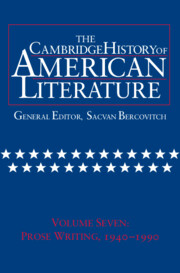Book contents
- Frontmatter
- Introduction
- The Drama, 1940—1990
- Fiction and Society, 1940–1970
- After the Southern Renascence
- Postmodern Fictions, 1960–1990
- 1 Rethinking Postmodernism
- 2 Fables of the Fetish
- 3 The End of Traditionalism
- 4 Women’s Fiction: The Rewriting of History
- 5 Conclusion
- Emergent Literatures
- Appendix: Biographies
- Chronology, 1940–1990
- Bibliography
- Index
1 - Rethinking Postmodernism
from Postmodern Fictions, 1960–1990
Published online by Cambridge University Press: 28 March 2008
- Frontmatter
- Introduction
- The Drama, 1940—1990
- Fiction and Society, 1940–1970
- After the Southern Renascence
- Postmodern Fictions, 1960–1990
- 1 Rethinking Postmodernism
- 2 Fables of the Fetish
- 3 The End of Traditionalism
- 4 Women’s Fiction: The Rewriting of History
- 5 Conclusion
- Emergent Literatures
- Appendix: Biographies
- Chronology, 1940–1990
- Bibliography
- Index
Summary
InThe Anatomy Lesson, Philip Roth’s Zuckerman — who has authored a book that sounds suspiciously like Portnoy’s Complaint — receives a letter from the editors of his old college newspaper. They “wanted to interview him about the future of his kind of fiction in the post-modernist era of John Barth and Thomas Pynchon.” Because Zuckerman is in the hospital suffering undiagnosed pain, the editors have sent a list of written questions: “1. Why do you continue to write? 2. What purpose does your work serve? 3. Do you feel yourself part of a rearguard action in the service of a declining tradition?”
These are not questions of the sort to cheer an ailing writer, but they do summarize the elitist view of post-1960s fiction. From this standpoint, Zuckerman’s humor and ethnicity and his lack of esoteric technique and political commitment demote his work to a “rearguard action, in the service of a declining tradition. ” Roth locates this attitude in the self-important undergraduate editors of The Anatomy Lesson (1983), but it is still pervasive in intellectual circles. The metaphor of the rearguard (and its correlate, the avant-garde) and the assignment of the “postmodernist era” to John Barth and Thomas Pynchon are symptomatic of a conception of literary history that itself should be labeled “a rearguard action in the service of a declining tradition,” for the student editors are speaking the language of modernism, the aesthetic ideology of the early twentieth century.
- Type
- Chapter
- Information
- The Cambridge History of American Literature , pp. 425 - 450Publisher: Cambridge University PressPrint publication year: 1999

